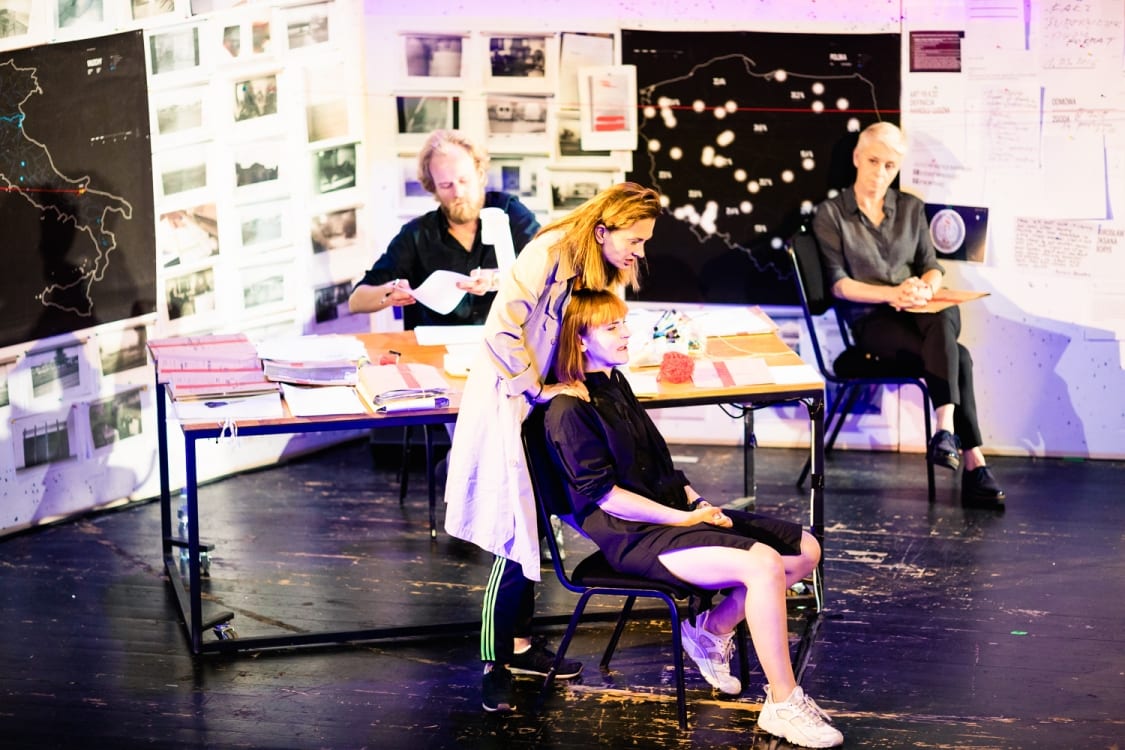Modern Slavery is not really a play in the traditional sense. It is a collaborative piece in which each of the cast has researched different aspects of modern slavery in and around Poland (with a particular focus on Warsaw where the company is based). They then proceed to tell these stories through statistics, court findings and interviews which are presented through a variety of media.
The piece is at times harrowing. Particularly in the second half where they tell – in some uncomfortable detail – of the stories of Polish nationals who found themselves trapped as slaves in Italy in the early 2000s. It leavens the mood at times with a couple of satirical sketches (some of which work better than others) but on the whole, this is a rightly sombre piece.
Overall, the narrative focuses on three particular areas of modern slavery. Ukrainians working in restaurants in Warsaw being run through “body leasing” (this being a festival focused on Ukrainians in Poland, this was particularly relevant), The aforementioned case of Polish slaves in Italy which was then built on by showing the third element of slaves from the middle east and Africa working in the exact same region.
The argument of the piece is powerful. That slavery is not simple a case of a few individual moral failings, but a systemic abuse of people. One that without which, major industries – particularly agriculture – could not exist in their current form. There are questions asked about consumer behaviour, what we could individually change to impact the modern slave trade (shrimp seems to be a particular problem as it turns out), but on the whole, the play asks for systemic change in financial systems and action at a governmental and international level.
The play is set in an atmosphere very familiar to anyone who has ever worked, volunteered at or even just visited an under-funded, over-worked NGO. The cast largely remain on stage throughout – and as each person takes on the narrative, the other work in the background updating the details on the wall or highlighting the stories being told through images on a projector. As a result, the set is a constantly moving wall of data, which itself highlights how overwhelming the problem is and how much vigilance is needed to counter it.
Modern Slavery is a complex piece with a simple message. Its format means that at times it is hard to follow in detail (of course, my lack of Polish doesn’t help) but it also means that the powerful overall message is driven home. This is probably the right way around. The collaborative approach also means that all the parts are given equal weight and as such, it is perhaps a little long and could use a slightly more judicious edit.
But this is quibbling and does not detract from the powerful overarching message of the piece. Modern Slavery may bombard you with information but that merely serves to tell you how much information there is to be found on this underexplored topic.
Ultimately Modern Slavery’s simple message is one we all need to hear. That too many modern slaves are living hidden lives in plain view of all of us. Too much of modern capitalism relies on us simply not seeing that. In delivering this clearly it achieves its artistic and political aims.

